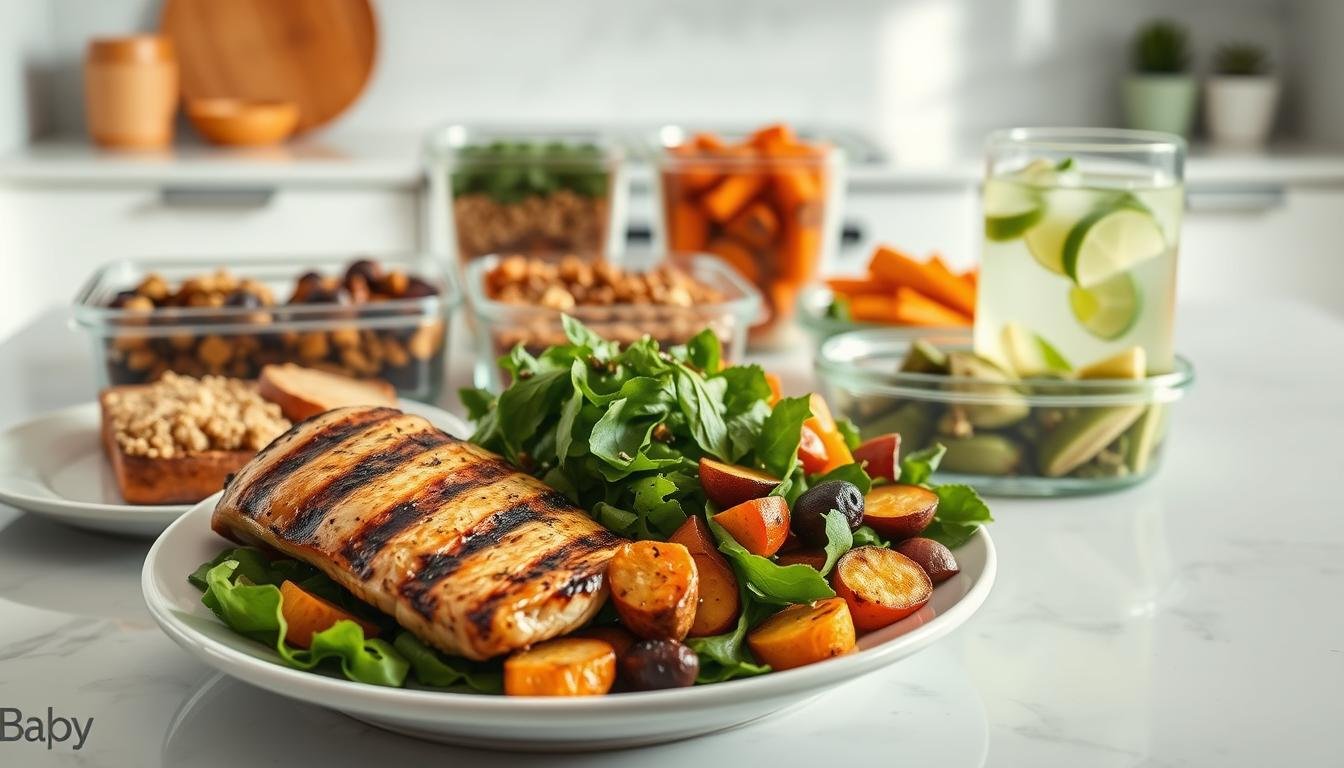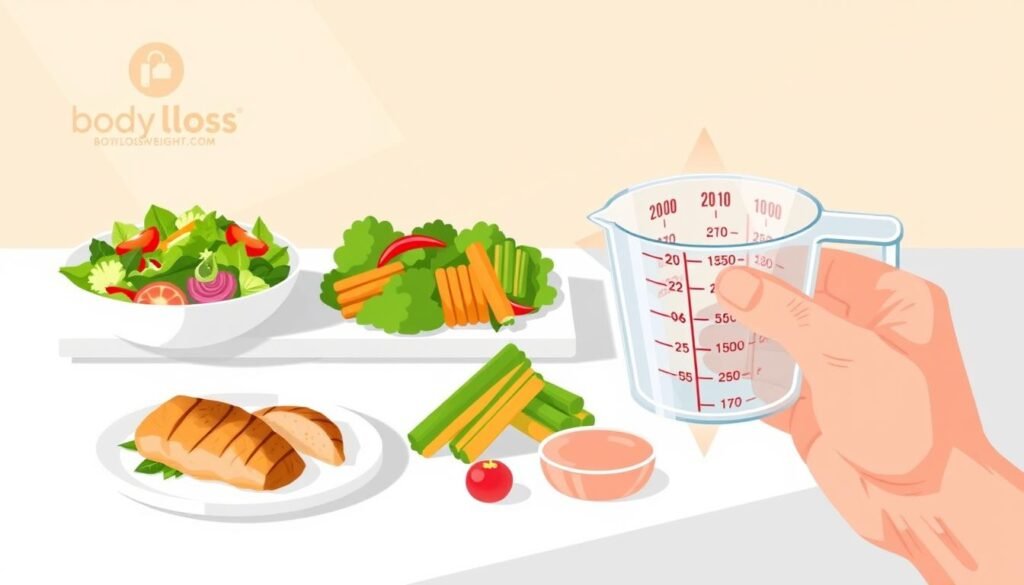Every amazing weight loss transformation starts with one step. Imagine a friend who couldn’t fit into their favorite jeans. Now, they stand in front of the mirror, admiring a healthier, fitter self.
Their journey was more than losing weight. It was about changing how they see food, exercise, and themselves. Stories like these show us hope and remind us we can change. They show us the power of hard work, the right attitude, and support.
Are you ready to start your own weight loss journey? You might be amazed at what you can achieve.
Key Takeaways
- Every weight loss journey starts with small, actionable steps.
- A strong mindset plays a crucial role in achieving lasting results.
- Real-life success stories inspire and motivate individuals on their path to transformation.
- Support from friends and community contributes significantly to success.
- Weight loss transformations encompass both physical and emotional changes.
- You can document your journey to track progress and celebrate milestones.
Understanding Weight Loss Transformation
Weight loss is more than just losing weight. It’s about starting a new life, changing habits, and feeling positive. It’s about both body and mind changes. Setting clear goals is key to lasting success.
What Constitutes a Transformation?
A transformation is a big change in your life and health. It includes exercise, eating right, and growing as a person. These help you see your goals and track your progress.
The Importance of Mindset in Weight Loss
Having a healthy mindset is crucial for losing weight. It keeps you motivated and focused. It helps you overcome challenges and celebrate your wins.
Real-Life Inspiring Weight Loss Success Stories
Many people have overcome big challenges to lose weight. Their stories are full of hope and motivation. They show us how hard work and dedication can change lives.
Lexlee Hudson’s Journey from 180 lbs to a Healthy Lifestyle
Lexlee Hudson gained 187 lbs in college due to bad eating habits. She joined Optavia to get healthier. Her story shows how hard work can change your life for the better.
Linda Migliaccio’s Fight Against Binge Eating Disorder
Linda Migliaccio lost 189 lbs by fighting binge eating disorder. She used nutrition to win her battle. Her story teaches us to tackle big challenges with a smart plan.
Ann Wulff’s Transformation through Simple Changes
Ann Wulff lost 207 lbs with WeightWatchers and small changes. Her story shows how steady effort can lead to big wins. Ann’s journey proves even small steps can add up over time.
The Steps to Initiate Your Own Transformation
Starting your own weight loss journey needs careful planning and commitment. It often starts with setting realistic weight loss goals. These goals should fit your lifestyle and what you can do.
By setting realistic goals, you stay motivated. You can also track your progress well.
Setting Realistic Goals for Weight Loss
When starting weight loss, focus on achievable milestones. Goals that are specific, measurable, attainable, relevant, and time-bound (SMART) help you stay on track. Here’s how to do it:
- Define your ultimate goal – Know exactly how much weight you want to lose or what physical achievements you aim for.
- Break it down – Divide your main goal into smaller, manageable milestones.
- Celebrate small victories – Recognizing achievements along the way boosts motivation.
Creating an Actionable Plan
After setting your goals, create a plan tailored to your needs. A good plan keeps you focused and avoids chaos. Consider these elements:
- Meal Planning – Prepare a weekly meal schedule that emphasizes healthy choices.
- Workout Routines – Incorporate a variety of exercises to make working out enjoyable.
- Schedule Time – Find specific times in your week dedicated to workouts and meal prep.
Having a good plan helps you avoid feeling overwhelmed. It makes your weight loss journey clearer and easier to follow.
Effective Weight Loss Strategies That Work
Using good weight loss strategies can really help you reach your goals. Meal prep and regular exercise are key. They help you lose weight and feel better overall.
Meal Prep and Planning for Success
Meal prep tips are key for losing weight. Making meals ahead lets you control what you eat. It stops you from eating too much junk.
Setting aside time for meal prep helps. You’ll always have healthy food ready. This makes it easier to stick to your diet.
Incorporating Exercise into Your Daily Routine
Exercise is great for losing weight and feeling good. It can be running, lifting weights, or yoga. It makes you happier and more energetic.
Having a workout plan is important. It helps you stay on track. You’ll feel proud of your progress and enjoy losing weight more.

| Strategy | Description | Benefits |
|---|---|---|
| Meal Prep | Preparing meals in advance to control portion and nutritional intake | Reduces unhealthy eating habits, saves time, and promotes consistency |
| Regular Exercise | Establishing a consistent workout routine | Enhances weight management, boosts mental well-being, and increases energy levels |
In summary, meal prep and exercise are great together. They help you lose weight and feel good. Taking these steps makes you stronger and happier.
Healthy Weight Loss Tips to Keep You on Track
Staying on track with weight loss means using smart strategies. These tips help you eat right and enjoy food more. Good habits are key to keeping up your progress.
Portion Control and Mindful Eating
Controlling portions is key to not eating too much. Use smaller plates or measure food to keep portions right. This way, you can enjoy meals without eating too much.
Eating mindfully helps with digestion and feeling full. Take time to enjoy each bite. This helps you stop eating when you’re full, avoiding extra snacks.
Hydration’s Role in Weight Management
Drinking enough water is also important for weight loss. Water helps with digestion, stops hunger, and boosts metabolism. Drink at least eight glasses a day to help manage your weight.
Tracking your water can help you stay hydrated. This small change can lead to healthier weight loss habits.
Support Systems for Weight Loss Journey
Success in weight loss often needs more than just wanting to lose weight. Having good support systems can really help. Friends can make the journey less lonely with their support and keeping you on track.
Looking for community support can also give you more motivation. This can be online or in-person groups. They offer resources and help to keep you moving forward.
The Role of Friends and Family
Your friends and family are very important. They can lift your spirits and keep you on track. They help in many ways, like:
- Encouraging healthy choices at social events.
- Exercising together to stay active.
- Sharing your goals and celebrating your wins.
Being around positive people makes it easier to stay focused and motivated.
Finding a Support Group or Community
Being part of a support group or community can change your game. It’s a place to share and get support from others who get it. Here’s why it’s good:
- You get tips and resources from others.
- There’s emotional support when things get tough.
- You feel part of a group, which boosts your motivation.
Local or online groups can be your tribe. They create a supportive space for your weight loss journey.
| Support Type | Description | Benefits |
|---|---|---|
| Friends | Close relationships providing encouragement and accountability. | Improved motivation, shared activities. |
| Family | Immediate support network offering stability and encouragement. | Consistent support, shared meals, and activities. |
| Support Group | Structured communities focused on weight loss and wellness. | Access to resources, shared experiences, emotional backing. |
| Online Community | Virtual spaces to connect with others on similar journeys. | Flexibility, diverse connections, and support from around the world. |
Navigating Setbacks and Challenges
Weight loss is a journey with ups and downs. It’s key to know how to handle setbacks. You might hit a weight loss plateau, which can be tough. Emotional eating can also pop up, making things harder.
Knowing these obstacles and how to overcome them is important. It will help you move forward.
Understanding Weight Loss Plateaus
Plateaus happen when your body gets used to eating less or moving more. It might feel like you’re not losing weight anymore. But remember, this is a normal part of losing weight.
Try new foods or exercise routines to get past it. Doing different workouts keeps your body interested.
Overcoming Emotional Eating Habits
Emotional eating is another hurdle. Eating when stressed can slow down your weight loss. Finding ways to deal with stress without food is key.
Try journaling or a new hobby. Create a space that supports mindful eating and growth. This will help you stay on track.
Adopting a Healthy Lifestyle for Longevity
Reaching your weight loss goals is a big step. But, the real challenge is keeping it up. It takes hard work and a long-term commitment to a healthy lifestyle.
Maintaining Weight Loss After Achieving Goals
To keep your weight off, make lasting habits part of your life. Exercise regularly and eat foods that are good for you. Keep track of how you’re doing to stay motivated.
Doing fun things like group workouts or cooking with friends can make it easier. It turns staying healthy into something enjoyable.
Integrating Wellness Practices into Daily Life
Adding wellness practices to your daily routine boosts your health. Simple things like mindfulness can help you feel more connected. Try yoga or meditation to lower stress and clear your mind.
Look into studies like this one for tips. Make your wellness habits fit your likes to keep them up.

Tips from the Experts: Personal Trainers and Coaches
Getting tips on weight loss can really help you get healthier. Personal trainers give advice on keeping up good habits and reaching your goals. It’s important to set goals you can really do.
Working hard every day, tracking your progress, and trying new things in your workouts are key. These steps help you succeed.
Common Advice from Successful Coaches
Many coaches say a balanced way is best. Here are some tips:
- Set achievable goals: Aim for small, easy-to-measure goals.
- Stay consistent: Make a routine that works for you.
- Incorporate variety: Try different exercises to stay fun.
- Accountability matters: Have a workout friend or join a group.
Resources for Further Learning
There are many resources to help you learn more about losing weight. Here are some:
- Books: Look for books on food and fitness.
- Apps: Use apps for tracking your workouts and meals.
- Online courses: Take classes on exercise and nutrition.
Documenting Your Weight Loss Transformation
Tracking your weight loss journey is key to reaching your goals. Using pictures and writing helps keep you motivated. You can take before and after photos or keep a journal to track your feelings and progress.
The Power of Before and After Photos
Before and after photos show your hard work. They prove your progress and inspire others. Looking at these photos, you’ll see how far you’ve come and feel proud of yourself.
Using Journals to Track Progress and Emotions
Keeping a journal is a great way to track your weight loss. It lets you write about your day, feelings, and achievements. This helps you face challenges and celebrate wins, keeping you on track.
| Method | Benefits | Tips |
|---|---|---|
| Before and After Photos | Visual proof of transformation, motivates others | Take photos from the same angle and lighting |
| Journaling | Reflect on progress and emotions, foster accountability | Write regularly and be honest about your feelings |
Conclusion
Your journey to lose weight is more than just losing pounds. It’s about starting a new life that makes you feel good. This guide shows how you can change your life for the better.
Changing your daily habits and having friends who support you helps a lot. Staying committed and facing challenges head-on is important. Every step you take brings you closer to your goals.
Starting this journey takes courage and determination. Use the advice given and think about the amazing stories. Believe in yourself and remember, every little bit helps your overall health.
FAQ
What is a weight loss transformation?
A weight loss transformation is big changes when you lose weight. It’s about physical, emotional, and lifestyle changes. You start to live healthier and grow as a person.
How important is mindset in a weight loss journey?
Mindset is very important. A positive mindset keeps you going and helps you face challenges. It’s key to overcoming psychological hurdles.
Are there any effective weight loss strategies I should consider?
Yes, there are good strategies. Meal prepping, regular exercise, and portion control are helpful. They make reaching your goals easier.
How can I stay accountable during my weight loss journey?
Having a support system helps a lot. Friends, family, or online groups can keep you on track. Sharing your journey boosts motivation.
What should I do if I experience a weight loss plateau?
If you hit a plateau, check your diet and exercise. Changing your routine might help you move forward again.
How can I maintain my weight loss after achieving my goals?
Keeping weight off means living healthy all the time. Regular exercise, good food, and mental health are key. Focus on lasting habits, not quick fixes.
What role does hydration play in weight loss?
Drinking enough water helps with digestion and hunger. It also boosts metabolism. Staying hydrated is good for your health and weight loss.
How can I document my weight loss progress effectively?
Use photos and a journal to track your progress. They help you see how far you’ve come. It keeps you motivated and accountable.






